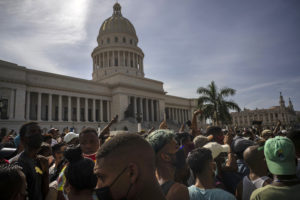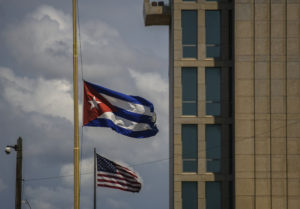Washington, DC—The Washington Office on Latin America (WOLA) applauds the bipartisan group of 55 senators who joined today to cosponsor the Freedom for Americans to Travel to Cuba Act of 2017. The act would end all remaining restrictions on the freedom of U.S. citizens to travel to Cuba; it was introduced today by Senators Patrick Leahy (D-VT) and Jeff Flake (R-AZ).
Current U.S. law prohibits tourist travel to Cuba and limits non-tourist travel to a dozen specific categories. The Freedom for Americans to Travel to Cuba Act of 2017 would end those restrictions, and treat travel to Cuba in the same way as the U.S. government treats citizen travel to every other country in the world.
“This bill demonstrates that, in spite of the uncertainty surrounding the future of U.S. policy towards the island, there is still overwhelming bipartisan support in Congress for ending U.S. restrictions on Cuba,” said Marguerite Jiménez, WOLA Senior Associate for Cuba. “The majority of the Senate has signed on to this bill, with support extending across the spectrum politically, and across the country.”
As a result of regulatory changes made between 2009 and 2014 that simplified the rules governing travel to Cuba, over 610,000 Americans traveled to Cuba in 2016 on family or educational trips. While the Trump Administration could reverse those changes, approval of the Leahy-Flake travel legislation by Congress would eliminate all restrictions. Under that scenario, travel numbers would increase dramatically in the coming years, opening up opportunities for U.S. citizens and for the U.S. travel industry.
Evidence from a recent poll conducted by a leading Cuba travel industry group, Cuba Educational Travel, shows that increased American travel to the island is having a direct and positive impact on the Cuban people and the Cuban private sector. Overwhelming percentages of U.S. visitors to Cuba patronize and support the artists, restaurateurs, bed and breakfast owners, and other entrepreneurs who make up the new private sector in Cuba.
In addition to the economic benefits, increased travel is also facilitating increased engagement among Cubans and Americans. Consider the fact that 85 percent of surveyed travelers visited the home of a Cuban family, 84 percent spoke to a Cuban about American society and culture, 70 percent exchanged views on the internet and technology, and 42 percent spoke with Cubans about religion and/or religious freedom on the island.
“This bill is good for Americans and Cubans and is a positive step forward for both countries,” said Jiménez. “WOLA welcomes its introduction and urges Congress to consider it promptly.”



